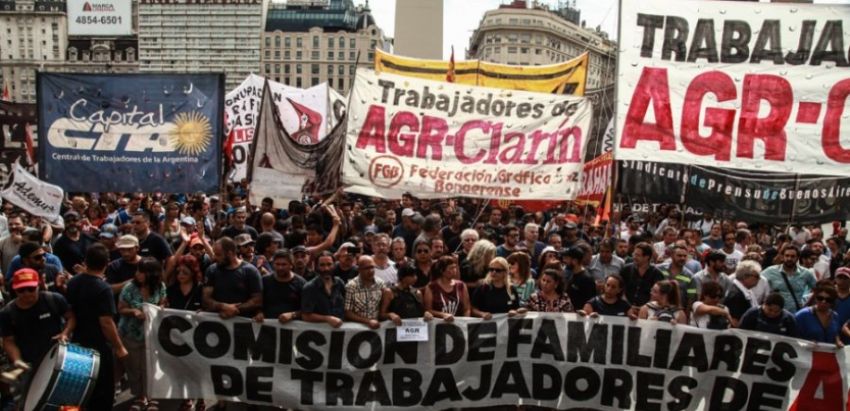
Printing plant workers in Buenos Aires showed up for their 6am shift as usual on January 16, only to find locked doors, police, and private security blocking their way. Grupo Clarín, the biggest media group in Argentina, had locked them out.
The 380 workers were sacked, with management planning to replace well-paid union workers with cheaper, non-union replacements.
Imagine if Fox News also owned the New York Times plus a cable company, internet providers, a slew of publishing houses, and radio and TV stations. In Argentina, the equivalent is the hugely powerful Grupo Clarín, which runs the largest newspaper in Latin America. It heavily promoted the candidacy of Argentina’s right-wing president Mauricio Macri, who was narrowly elected in 2015.
Macri’s comment on the lost jobs at the printing plant was that “one business with a problem closes, but at the same time, many more are opening up”.
Local union leaders quickly called an assembly, and workers unanimously decided to occupy the plant to demand their jobs back. The union says that Grupo Clarín is not in financial trouble, did not follow the steps the law requires for layoffs, and simply wants cheap labour.
The Buenos Aires-area graphic workers union that the local belongs to, the FGB, then called a 24-hour solidarity strike of all its members. It was answered by an impressive 83% participation. Both the local, which is run by an opposition caucus, and the FGB called for solidarity marches.
On January 19, on two days’ notice, thousands of members of other unions marched through downtown to the Ministry of Labour.
Pablo Wowk works on a three storey high press that is the largest in South America. He said the Clarin plant’s machinery, which prints pamphlets, phone books, school books and magazines, is modern but requires skill to operate — lots of “tricks” to make the machines run right.
None are functioning now, as workers settle in “until we get our jobs back”, said Ezequiel Gatti, a member of the local leadership. He said management had given no prior notice of the planned lockout.
Union members from a mattress factory have brought mattresses to sleep on, replacing the cardboard used the first night, and Coca Cola workers have donated plenty of their own product. Other unions and activists are providing food.
On January 20, singers who are struggling to reform their musicians’ union performed opera solos including “O sole mio” in front of the plant gates, to great applause from the crowd of supporters.
On the occupation’s second day, police tried to remove workers’ families and other supporters from outside the gates, a confrontation that was broadcast by a non-Clarín outlet. For now, the union has obtained an order preventing the police from moving in.
At the boisterous march, union delegations included teachers, port workers, maritime workers, leather workers, subway workers, court workers, metal workers, city and state employees, and even the lifeguards union.
Both the more conservative CTG labour federation, to which the FGB belongs, and the more militant CTA were present. Many union caucuses marched with their own flags, banners and vests.
Daniel Ximenez, a founder of the Labour Studies Workshop (TEL in Spanish), a union-education group, said the solidarity was important: “There have been many strikes, road blockages, marches, and demonstrations this year, but this strike is one of the few called by an important union to support a strike in one plant.”
The action is also important because it is against the Grupo Clarín monopoly, says Wowk: “If they can get rid of us, they will come after other graphic workers next.”
[Abridged from Labor Notes.]